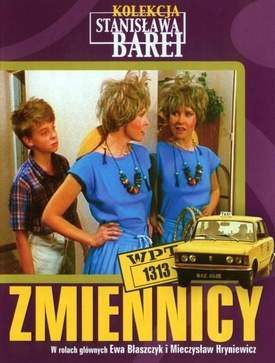History
Przekrój was created by the writer and graphic artist Marian Eile-Kwaśniewski (1910–1984) from Warsaw who, until 1969, was also the first and only editor-in-chief of the magazine. The magazine focused on current social, political and cultural events, both Polish and international. In the 1970s Przekrój reached a record circulation, with 700,000 copies per issue, by far the most popular magazine in the country. As of 2011, it had a modest circulation of 73,000 copies. [2]
The list of editors in chief in chronological order includes Marian Eile (1945–1969), Mieczysław Kieta (1969–1973), Mieczysław Czuma (1973–2000), Maciej Piotr Prus (2000–2001), Józef Lubiński (2001), Jacek Rakowiecki (2001–2002), Roman Kurkiewicz (2002), Piotr Najsztub (2002–2006), Mariusz Ziomecki (2006–2007), Jacek Kowalczyk (2007–2010), Katarzyna Janowska (2010–2011), Artur Rumianek (2011), Donat Szyller (2011), Roman Kurkiewicz (2012), Zuzanna Ziomecka, Marcin Prokop (2012-2013) and Tomasz Niewiadomski (from 2016).
Following its closure in 2013, Przekrój was out of print until December 2016, when it was relaunched as a quarterly, with an editorial style deeply inspired by the early editions of the magazine from the 1950s and 1960s. [1]
Among the former contributors to Przekrój were such figures of the Polish literary and art scene as Maria Dąbrowska, Jarosław Iwaszkiewicz, Jan Brzechwa, Bohdan Butenko, Konstanty Ildefons Gałczyński, Kazimierz Wyka, Daniel Mróz, Jerzy Waldorff, Sławomir Mrożek, Ludwik Jerzy Kern, Joanna Oparek, and Jan Błoński.

Morski Związkowy Klub Sportowy Arka Gdynia is a professional football club based in Gdynia, Poland, that plays in the Polish I liga. The club was founded as Klub Sportowy Gdynia in 1929.

The Polish Mathematical Society is the main professional society of Polish mathematicians and represents Polish mathematics within the European Mathematical Society (EMS) and the International Mathematical Union (IMU).

The Nike Literary Award is a literary prize awarded each year for the best book of a single living author writing in Polish and published the previous year. It is widely considered the most important award for Polish literature. Established in 1997 and funded by Gazeta Wyborcza, Poland's second largest daily paper, and the consulting company NICOM, it is conferred annually in October. It is open for nominees from all literary genres, including non-fiction essays and autobiographies.
Nocna zmiana is a 1995 Polish documentary film about the events of the night 4 June 1992 when a coalition of Polish parliamentary forces voted no confidence in Olszewski's government, presenting is as a sort of coup. It was directed by Michał Balcerzak. The documentary revolves around the recording of an open meeting of Donald Tusk, Lech Walesa, and Waldemar Pawlak. The film's thesis is that the goal was removing Olszewski's government before it passed a law allowing the public to see top secret government archives listing communist collaborators, allegedly including Lech Walesa as a paid informer of the communist government. Olszewski's minority government was removed from power and the law was never passed. 20 years later, the widow of the communist Minister of Internal Affairs, Kiszczak, a person responsible for at least 200 murders, tried to sell documents allegedly showing Walesa's collaboration and was detained for illegal possession of top secret archives.

Zmiennicy is a Polish comedy TV series completed in 1986 and aired in 1987. Many famous Polish actors appear in Zmiennicy.

Warsaw City Council, officially the Council of the Capital City of Warsaw is a unicameral governing body of the city of Warsaw, the capital of Poland.
The 9th Mieczysław Połukard Criterium of Polish Speedway League Aces was the 1990 version of the Mieczysław Połukard Criterium of Polish Speedway Leagues Aces. It took place on March 25 in the Polonia Stadium in Bydgoszcz, Poland.

Kisiel Prize or Kisiel Award is an annual Polish award presented in three categories: publicist, politician/public figure and entrepreneur whose actions most closely portray the spirit and beliefs of the Polish publicist and politician, Stefan Kisielewski (1919-1991).
Tax and Customs Service is the customs service of the Republic of Poland and is the uniformed and armed law enforcement agency component operating its own tactical units, within the National Revenue Administration subordinate to the Polish Ministry of Finance. In its current form, it was established in 2017 by merging the pre-existing Polish Customs Service, created in 1999 from the reformed Central Customs Office until 1953 known as Central Board of Customs, with the fiscal control service, and incorporating it together with the tax administration into the newly established KAS umbrella structure. It is responsible for assessing and collecting customs duties and excise, exercising customs control, primarily at the Poland's borders, the entire tax intelligence, targeted fiscal inspections, supervision of legal and combatting illegal gambling, as well as exercising tasks related to tax, customs and illegal gambling investigations in criminal cases, including tactical operations.
The Polish Film Academy is a professional honorary organization dedicated to the advancement of the arts and sciences of motion pictures.
This page is based on this
Wikipedia article Text is available under the
CC BY-SA 4.0 license; additional terms may apply.
Images, videos and audio are available under their respective licenses.






